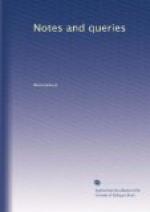X.Y.A.
Kilkenny.
* * * * *
MINOR NOTES.
Borrowed Thoughts.—Mr. SINGER (Vol. i., p. 482.) points out the French original from which Goldsmith borrowed his epigram beginning—
“Here lies poor Ned Purdon.”
I find, in looking over Swift’s works, a more literal version of this than Goldsmith’s:—
“Well then, poor G——
lies under ground,
So there’s an end of
honest Jack;
So little justice here he found,
’Tis ten to one he’ll
ne’er come back.”
I should like to add two Queries:—Who was the Chevallier de Cailly (or d’Aceilly), the author of the French epigram mentioned by Mr. Singer? And—when did he live?
H.C. DE ST. CROIX
An Infant Prodigy in 1659.—The following wonderful story is thus related by Archbishop Bramhall (Carte’s Letters, ii. 208.: Dr. Bramhall to Dr. Earles, Utrecht, Sept. 6-16, 1659):—
“A child was born in London about three months since, with a double tongue, or divided tongue, which the third day after it was born, cried ‘a King, a King,’ and bid them bring it to the King. The mother of the child saieth it told her of all that happened in England since, and much more which she dare not utter. This my lady of Inchiguin writeth to her aunt, Me brow van Melliswarde[4], living in this city, who shewed me the letter. My Lady writeth that she herself was as incredulous as any person, until she both saw and heard it speak herself very lately, as distinctly as she herself could do, and so loud that all the room heard it. That which she heard was this. A gentleman in the company took the child in his arms and gave it money, and asked what it would do with it, to which it answered aloud that it would give it to the King. If my Lady were so foolish to be deceived, or had not been an eye and ear witness herself, I might have disputed it; but giving credit to her, I cannot esteem it less than a miracle. If God be pleased to bestow a blessing upon us, he cannot want means.”
It can hardly be doubted that the Archbishop’s miracle was a ventriloquist hoax.
CH.
[Footnote 4: The name
of the Dutch lady, mis-written for De
Vrouw, &c.]
Allusion in Peter Martyr.—Mr. Prescott, in his History of the Conquest of Mexico vol. i. p. 389. (ed. 8vo. 1843), quotes from Peter Martyr, De Orbe Novo, dec. 1. c. l., the words, “Una illis fuit spes salutis, desperasse de salute,” applied to the Spanish invaders of Mexico; and he remarks that “it is said with the classic energy of Tacitus.” The {102} expression is classical, but is not derived from Tacitus. The allusion is to the verse of Virgil:—
“Una salus victis nullam sperare salutem.”
AEn. ii. 354.




